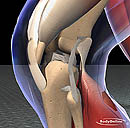Steve Scarff Benefits of Chondroitin for Osteoarthritis Interview

Steve Scarff Benefits of Chondroitin for Osteoarthritis Interview
The Australian Self Medication Industry (ASMI) welcomed new research that confirmed the benefits of chondroitin sulphate for osteoarthritis.
A Cochrane Review of 9,110 people across 43 randomised controlled studies revealed that chondroitin sulphate (alone or in combination with glucosamine) was better than placebo in improving pain in participants with osteoarthritis in short term studies. The review also revealed a slight slowing of the narrowing of the joint space on X-rays of the affected joint, and improved quality of life, using an index which included measures of pain, function and disability. Chondroitin sulphate was found to have a lower risk of adverse events compared with control.
ASMI Regulatory and Scientific Affairs Director, Mr Steve Scarff, said: 'ASMI welcomes new research that adds to the body of knowledge on complementary medicines.
'Evidence about the efficacy and safety of complementary medicines is important so that consumers can be confident of the claims made about them.
'This Cochrane Review is a great way of making sense of a large number of studies, helping consumers and other stakeholders to understand the benefits of chondroitin sulphate in osteoarthritis," Mr Scarff added.
Interview with ASMI Regulatory and Scientific Affairs Director, Steve Scarff
Question: What is chondroitin sulphate?
Steve Scarff: Chondroitin sulphate is a component of the human connective tissues known as glycosaminoglycans which are found in cartilage and bone, and help form the structural integrity of connective tissues. Products containing chondroitin sulphate are available without prescription from pharmacies as well as in grocery stores and health food shops.
Question: Can you talk about the benefits of chondroitin sulphate for Osteoarthritis?
Steve Scarff: Osteoarthritis is a degenerative condition of the joints, where the cartilage that cushions the joints wears down with use leading to pain. The benefit of chondroitin sulphate in osteoarthritis is its role in strengthening connective tissue, such as cartilage, to help slow the degradation of this cushioning. Chondroitin is thought to work by stopping the degradation of cartilage and restoring lost cartilage. This can help slow the progress and help relieve the symptoms of osteoarthritis.
A systematic review has recently been published which summarises the results of 43 different studies looking at chondroitin sulphate and osteoarthritis. This review showed that chondroitin sulphate (alone or in combination with glucosamine):
Relieved pain in participants with osteoarthritis,
Slowed the narrowing of the joint space of affected joints, and
Improved quality of life.
The review also found that chondroitin sulphate had a low risk of adverse events.
The popularity of chondroitin is a reflection of its effectiveness and its low risk.
Question: How will this change the way we treat Osteoarthritis?
Steve Scarff: This systematic review provides further support for the current use of chondroitin sulphate to reduce the pain and slow the cartilage degradation associated with osteoarthritis.
Question: How long until chondroitin sulphate will be used as a treatment for Osteoarthritis in Australia?
Steve Scarff: Chondroitin sulphate is already available in Australia and has a long history of use in relieving the pain from osteoarthritis.
Question: What are the symptoms associated with Osteoarthritis?
Steve Scarff: The main symptoms of osteoarthritis include joint pain, stiffness, reduced mobility and swelling, however it can also extend to muscle weakness, joints cracking and creaking, and joint deformity.
Question: How common is Osteoarthritis in Australia?
Steve Scarff: According to the Australian Institute of Health and Welfare 1 person in 13 ( 8% of the population, or 1.8 million people), reported themselves as experiencing the symptoms of osteoarthritis in 2011-12.
Question: Can you talk about the prevention of Osteoarthritis?
Steve Scarff: Osteoarthritis is a degenerative condition, attributed to wear and tear on the cartilage that protects and cushions your joints. Factors such as age, heredity and gender all contribute to the development of osteoarthritis, and hence these are not really avoidable. Maintaining a healthy weight helps reduce the load on joints, and can therefore help slow the degradation. Low-impact exercise can also help strengthen joints and muscles. Although no specific diet has been shown to reduce the risk of osteoarthritis, ensuring a nutritious diet helps provide the building blocks for bone, joint and muscle growth and development, and this may help reduce the severity of osteoarthritis in the long term.
Question: How is Osteoarthritis currently treated?
Steve Scarff: Osteoarthritis cannot currently been stopped or reversed, however there are a broad range of products available for helping to reduce the symptoms of osteoarthritis to help maintain quality of life measures. Oral medicines (such as paracetamol and non-steroidal anti-inflammatory drugs or NSAIDs) and topical medicines are currently available over the counter for pain relief. Chondroitin sulphate (alone or in combination with glucosamine) has been shown to be effective. Other complementary medicines such as Curcumin and fish oil are the subject of ongoing studies. These all help to provide a range of options for those experiencing pain associated with osteoarthritis. Maintaining a healthy weight, exercising and eating a balanced diet will also help.
Interview by Brooke Hunter
Have You Seen This?
MORE











